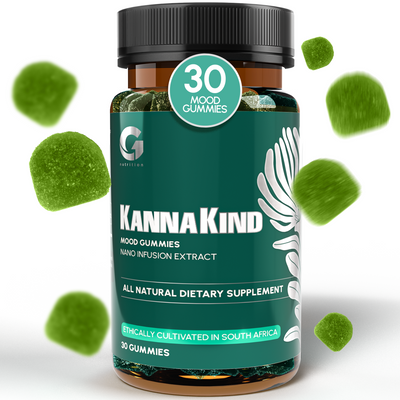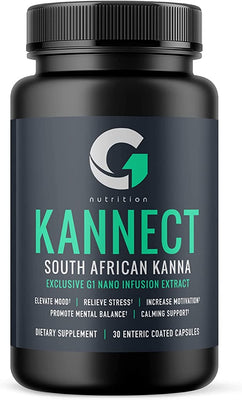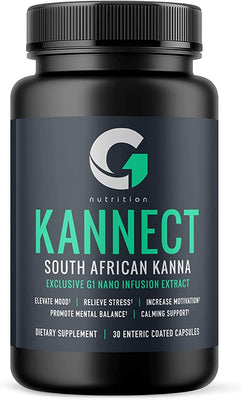Finding natural ways to manage stress, sharpen focus, and elevate your mood can feel like a big challenge. As people explore herbal supplements for mental wellness, one plant has gained significant attention: Kanna. Also known as Sceletium tortuosum, this unique succulent has a long history of use and is now available in modern forms like capsules and gummies.
This guide explores everything you need to know about Kanna extract. We will cover its traditional roots, its potential benefits for mood and cognition, and how it works in the body. We will also discuss important safety information, including risks, side effects, and responsible usage guidelines to help you make an informed decision.
What Is Kanna Extract?
Kanna extract is a concentrated form of the plant Sceletium tortuosum. For generations, this plant has been valued for its ability to support a sense of well-being. Today, modern extraction techniques allow manufacturers to create potent supplements that capture the plant's key active compounds, making its benefits more accessible than ever. By concentrating the plant’s key ingredients, extracts offer a consistent and reliable way to experience what Kanna has to offer.
Overview of Sceletium tortuosum
Sceletium tortuosum, commonly called Kanna, is a small succulent plant native to South Africa. It thrives in the dry, arid regions of the country, where it has been a part of the local culture for centuries. The plant is characterized by its fleshy leaves and delicate flowers, which can range in color from white and yellow to pale pink.
Historically, the whole plant was used, but the parts that contain the highest concentration of active compounds are the leaves and stems. After harvesting, these parts are traditionally prepared through a specific fermentation process. This step is crucial, as it reduces oxalic acid levels (which can be harmful in high amounts) and enhances the profile of beneficial alkaloids. This time-honored preparation method forms the basis for the high-quality Kanna extracts available today, ensuring they are both effective and safe for consumption.
How Kanna Is Traditionally Used
The use of Kanna is deeply woven into the cultural fabric of the San and Khoikhoi peoples of Southern Africa. For well over a thousand years, these indigenous communities have utilized the plant in various social and spiritual ceremonies. Traditionally, the fermented plant material was chewed, and the saliva swallowed. This method was often used to relieve thirst, fight fatigue, and elevate spirits during long journeys.
Early reports from travelers and botanists documented its use for promoting relaxation and a sense of connection. It was not used as a hallucinogen but rather as a mood-altering substance that could help ease social tension and promote a feeling of well-being. This rich history of traditional use is what first brought Kanna to the attention of the Western world, sparking interest in its potential for natural stress relief and mood support.
Benefits of Kanna Extract
Modern interest in Kanna centers on its potential to support mental and emotional wellness. Users turn to it for help navigating the pressures of daily life, from demanding work schedules to personal stress. While research is ongoing, anecdotal reports and preliminary studies point to several key benefits.
Mood and Stress Support
One of the most celebrated Kanna benefits is its role in promoting a positive mood and managing feelings of stress. Many users report a sense of calm and relaxation after taking Kanna, without the sedation that can come with other supplements. It may help quiet a busy mind, making it easier to navigate stressful situations.
Instead of numbing emotions, Kanna is often described as helping to create a state of "wakeful serenity." It can help elevate your outlook, fostering a more positive and resilient mindset. This makes it a popular choice for those looking to naturally support their emotional balance and overall sense of well-being.
Energy, Focus, and Cognitive Effects
Beyond its calming properties, Kanna is also known for its ability to support cognitive function. Unlike stimulants that can cause jitters and a subsequent crash, Kanna may offer a smoother, more sustained boost in mental energy and clarity. Many people use it to enhance focus and concentration during work or study.
This dual action of promoting calmness while sharpening focus is unique. It allows for a state of relaxed alertness, where you can be productive and engaged without feeling overwhelmed or anxious. Some users find it helps them enter a "flow state," making tasks feel more effortless and enjoyable. This cognitive enhancement is a key reason why Kanna is gaining popularity among professionals, students, and anyone looking to optimize their mental performance.
Other Potential Health Benefits
While mood and cognitive support are its primary uses, emerging research suggests Kanna may have other health benefits. The plant contains compounds with antioxidant properties, which help the body combat cellular damage caused by free radicals. Chronic inflammation is linked to numerous health issues, and some studies indicate that Kanna’s active compounds may possess anti-inflammatory effects.
These additional properties contribute to its profile as a holistic wellness supplement. By supporting the body's natural defense systems, Kanna may offer benefits that extend beyond the mind, contributing to overall physical health and vitality.
How Kanna Extract Works
Kanna’s effects are not magic; they are rooted in its unique biochemical properties. The plant contains a symphony of active compounds that interact with the body's neurological pathways, particularly those involved in mood and stress regulation. Understanding how it works can help you appreciate its potential.
Key Active Compounds (Alkaloids)
The primary drivers of Kanna’s effects are a group of alkaloids, which are naturally occurring chemical compounds. The most researched alkaloids in Sceletium tortuosum include:
- Mesembrine: This is often considered the most important alkaloid in Kanna. It is primarily known for its function as a serotonin reuptake inhibitor, which plays a major role in mood regulation.
- Mesembrenone: This compound is a potent inhibitor of an enzyme called PDE4. By blocking PDE4, mesembrenone can have positive effects on mood, cognitive function, and inflammation.
- Mesembrenol: This alkaloid works synergistically with the others to contribute to the overall calming and mood-lifting effects of the plant.
The specific ratio of these alkaloids in a Kanna product is crucial. High-quality extracts are standardized to ensure a consistent and effective balance, delivering reliable results with each dose.
Mechanisms of Action
The alkaloids padrões in Kanna work through several key mechanisms to produce their effects:
- Serotonin Reuptake Inhibition: Mesembrine helps increase the availability of serotonin in the brain. Serotonin is a neurotransmitter often called the "feel-good" chemical because it is vital for mood, happiness, and well-being. By preventing its reabsorption, Kanna helps maintain higher levels of active serotonin, which can lead to an elevated mood and reduced feelings of anxiety. This mechanism is similar to how some prescription antidepressants (SSRIs) work.
- PDE4 Inhibition: Mesembrenone’s ability to inhibit the PDE4 enzyme is another significant pathway. PDE4 is found throughout the body, including in brain regions associated with learning, memory, and emotion. By inhibiting this enzyme, Kanna can help improve cognitive function, reduce inflammation, and support a more positive mood.
- General Neurotransmitter Modulation: Beyond serotonin and PDE4, Kanna also appears to interact with other neurotransmitter systems in the brain, including the VMAT-2 receptor, which is involved in the release of dopamine and other catecholamines. This complex interplay of effects contributes to its unique ability to both calm and energize, creating a balanced state of mind.
Featured Products
Risks and Side Effects
Like any supplement, Kanna is not without potential risks and side effects. While it is generally well-tolerated by most people, it is important to be aware of možné adverse reactions and to use it responsibly. Prioritizing safety ensures you can have a positive and beneficial experience.
Common Side Effects
Most Kanna side effects are mild and tend to resolve on their own as your body adjusts. They are more likely to occur with higher doses or when first starting to use the supplement. Common side effects may include:
-
Mild headaches
-
Light-headedness or dizziness
-
Nausea or mild gastrointestinal upset
-
A temporary increase in anxiety before relaxation sets in (less common)
If you experience any of these effects, they are often temporary. Lowering your dose or taking Kanna with a small meal can sometimes help mitigate them. If side effects persist or are severe, you should discontinue use and consult with a healthcare professional.
Who Should Avoid Kanna
Kanna is not suitable for everyone. Certain individuals should avoid using it due to potential negative interactions or unknown effects. You should not take Kanna if you are:
- Taking SSRIs or MAOIs: Because Kanna acts as a serotonin reuptake inhibitor, combining it with prescription antidepressants like SSRIs (e.g., Prozac, Zoloft) or MAOIs can lead to a dangerous condition called serotonin syndrome. Symptoms can range from mild agitation to severe, life-threatening reactions.
- Pregnant or Nursing: There is not enough research to confirm Kanna's safety for pregnant or breastfeeding individuals. To err on the side of caution, it should be avoided.
- Under 18 Years Old: The effects of Kanna on a developing brain are unknown, so it is not recommended for children or adolescents.
- Have Certain Medical Conditions: If you have a serious medical condition, especially related to liver, kidney, or heart health, it is best to consult your doctor before using Kanna.
Precautions and Responsible Use
To ensure a safe experience with Kanna, always follow responsible use guidelines. First and foremost, consult with a qualified healthcare professional before adding any new supplement to your routine, especially if you take other medications or have underlying health concerns.
Always choose high-quality products from reputable suppliers who provide transparency about their sourcing and manufacturing processes. Look for products that specify the alkaloid content, as this is a marker of a standardized and reliable extract. Finally, never exceed the recommended dosage on the product label.
How to Use Kanna Extract
Using Kanna effectively involves choosing the right form, finding your ideal dose, and understanding how to optimize its effects. Because everyone's body chemistry is different, what works for one person may not work for another. A little experimentation and patience can help you find your sweet spot.
Forms of Kanna
Kanna is available in several different forms, each offering a unique experience:
-
Capsules: This is one of the most popular forms, offering a pre-measured, convenient, and tasteless way to take Kanna. Capsules are great for daily use and make it easy to track your dosage.
-
Gummies: A tasty and enjoyable way to consume Kanna, gummies offer a pleasant flavor and a pre-set dose, much like capsules.
-
Powders and Extracts: These versatile forms can be mixed into drinks like tea or smoothies. They offer more flexibility in dosing but require careful measurement.
-
Tinctures: Liquid extracts that are typically taken sublingually (under the tongue) for faster absorption.
Recommended Dosage Guidelines
Kanna dosing can vary widely depending on the form, the extract's potency, and individual factors like body weight and sensitivity. There is no one-size-fits-all dosage.
A crucial principle of using Kanna is to start low and go slow. Begin with the lowest recommended dose for the product you are using. Stay at that dose for several days to see how your body responds before considering an increase. Some people feel effects right away, while for others, the benefits build up over several days of consistent use. Taking more than needed will not necessarily enhance the positive effects and may increase the risk of side effects.
Tips for Best Results
To get the most out of your Kanna experience, consider these tips:
- Timing is Key: Some people prefer taking Kanna in the morning to support focus and mood throughout the day. Others find it helpful in the afternoon to combat a midday slump or in the evening to unwind.
- Take It with Food: If you experience any mild stomach upset, try taking your Kanna supplement with a small snack or meal.
- Consistency Matters: For long-term mood support, consistent daily use is often more effective than taking it sporadically. The alkaloids can take a few days to build up in your system to their optimal level.
- Be Mindful: Pay attention to how you feel. Keeping a simple journal of your dose, timing, and effects can help you fine-tune your routine for the best results.
Bottom Line
Kanna extract, derived from the South African plant Sceletium tortuosum, is a promising natural supplement for those seeking to support their mood, reduce feelings of stress, and enhance cognitive function. With a rich history of traditional use and modern science beginning to uncover its mechanisms, Kanna offers a unique blend of calm and clarity.
However, responsible use is paramount. Understanding its potential risks, especially the critical interaction with SSRIs and MAOIs, is essential for safety. By choosing high-quality products, starting with a low dose, and consulting with a healthcare professional, Kanna can be a valuable tool in your wellness toolkit. When used thoughtfully, it can help you navigate life's challenges with a more balanced and positive state of mind.



